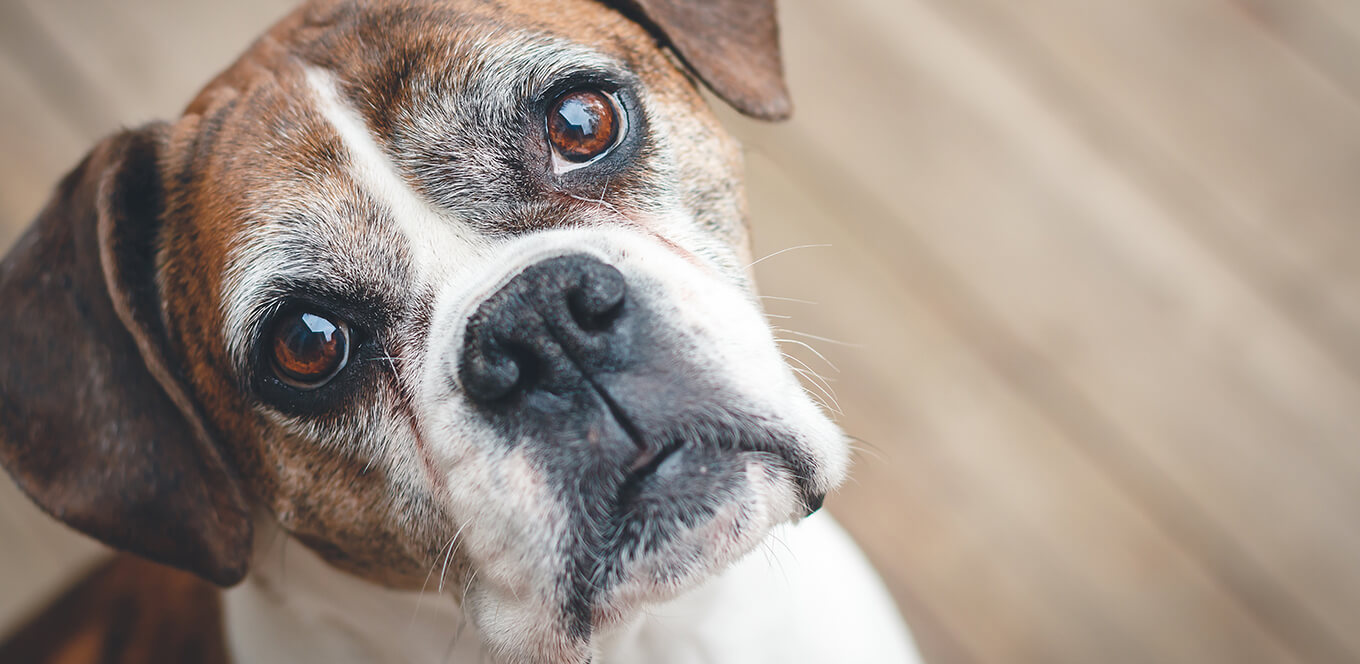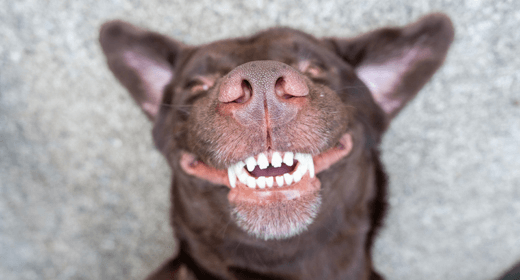

Does your mature dog sniff at his bowl and walk away instead of digging in? You may think he’s just being picky, but it’s important to keep an eye on how much he’s eating — especially if he’s a senior. While age-related diminishment of the senses of smell and taste may account for some of his disinterest in food, appetite loss can also indicate a serious medical problem.
“It’s important to give your dog enough calories because weight loss can be debilitating to senior pets,” says Wendy Brooks, D.V.M., who warns that a loss in appetite should be mentioned to your vet. A good rule of thumb: If your pet hasn’t eaten in a day, make a visit to the vet. Here are six ways to entice your canine friend with a nourishing meal.

Many animals find canned food more palatable because they like the taste and texture, Brooks says. You can top their favorite dry food with room-temperature wet food.
Dogs like a warm or room-temperature (not hot or cold) meal. Avoid serving him day-old wet food from the refrigerator, and keep his food away from heat. Another reason he might not be eating: It's too hot outside.
Dogs prefer consistency when it comes to their food. Don't change every day, but try a new flavor, such as lamb or chicken, and see if he responds (it may trigger his sense of smell). To avoid an upset stomach, introduce a new food by mixing it with his old food in equal increments each day.
Common mature-dog health issues, such as arthritis or joint pain, can make it difficult for him to access his bowls. Keep food and water where he spends most of his time. Put a water bowl on all floors of the house, too.
Older pets are at a higher risk of dehydration. Provide a clean bowl with fresh water at all times. It will help prevent disease, such as a kidney condition, and aid in digestion.
Dogs are people pleasers. If you see him eating, give him a little verbal reward. He'll know it makes you happy and will repeat the behavior.


We all want the best for our pets, and maintaining good oral hygiene is crucial to their overall health and wellbeing. This means keeping your dog’s teeth clean regularly and taking it for annual dental check-ups as well. Without proper oral care, your dog can develop dental diseases like plaque buildups, gingivitis, and tartar, which can have serious consequences, leading to tooth loss and other infections in your dog’s body.
Taking proper care of your dog’s teeth and feeding nutritious food will reduce their risk of developing oral illnesses in the future. Besides, brushing your dog's teeth can be a great bonding experience for you, and your dog may slowly come to love the activity.
As a dog parent, you would want your dog’s mouth to be fresh and healthy. Here are 5 reasons why your dog’s dental care is important for its overall health.
Dental pain can be extremely unpleasant for dogs, especially when it is severe. This can be avoided by keeping your dog's gums and teeth healthy.
When the bones that support your dog’s teeth get infected or damaged, they may weaken and fall out. Providing good dog oral care will ensure that your dog oral care remain healthy.
Bacteria residing in the plaque can enter your dog’s bloodstream and travel to the kidneys, heart, and liver. This spread of germs can harm its organs and make your dog sick. It is here that good oral hygiene will prevent bacteria and associated organ damage in your dog.
If the smell of your dog’s breath makes you gag, then know that your dog needs a dental cleaning session. But when your dog has healthy teeth and mouth, bad breath will not be an issue.
Since many dogs develop dental disease by the age of three, preventing it might be tough. But good dog dental care can prevent oral diseases from escalating to the point where it causes problems throughout its body.
Dogs need regular oral care just like you do; gum disease and broken teeth are the major concerns. Fortunately, pets seldom suffer from tooth decay. Their cone-shaped teeth, non-acidic saliva, and low-sugar diets all help protect them from this nasty ailment. Regular brushing and professional teeth cleaning can keep your dog’s teeth clean, healthy, and gleaming. Giving your pet appropriate toys to chew is known to prevent fractures.
Note: If you give your pets sweets for snacks, they can get cavities.
It should just be you and your dog, with no other children or pets in the house.
Dog toothbrushes can be easily found in pet stores or on the internet. But remember to use only dog-specific toothpaste while brushing your dog’s teeth.
Make sure you are in a well-lit area so you can see what you're doing when brushing your dog's teeth and that your dog is comfortable.
Begin by displaying the toothpaste to your dog and allowing them to lick it off your finger.
Hold its upper lip up and brush the top front teeth.
Brush the bottom teeth while holding the bottom lip down. Begin with the front teeth, and then work your way to the side and back.
If your dog is sitting still while you’re brushing its teeth, you can brush both the interior and outside of its teeth at the same time. Brushing the insides of the teeth is a little more difficult, so add this step after your dog is calm and after the outsides of its upper and lower teeth have been brushed.
Brushing your dog’s teeth may be an odd experience. Thus, praise your dog constantly to make this a happy experience. Although it may seem unusual to offer treats when you’re brushing your dog’s teeth. But the primary goal should be to teach the skill, and then you may focus on removing food from the equation later.
When your puppy first begins to get permanent teeth, check if the baby tooth has come out for the new tooth grow. Retained teeth can cause the permanent teeth to be crooked. Toy dog breeds, with their tiny jaws, are more prone to such dental problems.
While hard foods and chew toys can help keep teeth clean, you need to get your pet used to a regular tooth brushing. As soon as you bring your new pet home, get it accustomed to having its mouth handled. It is also good training—it teaches the dog to tolerate having things in his mouth without biting or snapping.
What your dog eats affects its 'smile.' Dry foods and treats help clean plaque from its teeth. Rawhide chews are also good cleaning tools, as are some of the knobby plastic toys on the market. None of these are hard enough to cause tooth damage, however monitor your dog to be sure that it doesn’t swallow small pieces of these toys. Real bones can also be dangerous for your pet and should not be used for tooth-cleaning purposes.
All dry adult IAMS™ Dog Foods, include Daily Dental Care, a special kibble coating that helps reduce tartar buildup for better oral health. So, along with providing balanced nutrition, our range of dry dog food focuses on dental hygiene as well.
It just takes a little time and patience. Begin by running your finger gently over his gums. At first, just rub the outside, but as he adjusts to the routine, begin to open his mouth and rub the gums inside the teeth as well.
As your dog gets accustomed to this, wrap your finger with gauze and rub his gums. Eventually, add a pet toothpaste; do not use human toothpaste. After a few weeks, your dog should be willing to accept a toothbrush for pets, which should have soft, multi-tufted synthetic bristles.
Hold the toothbrush at a 45-degree angle and apply it to the area where teeth and gums meet. Rotate it in small circles, overlapping several teeth. Finish with vertical strokes to pull plaque from between the teeth. Repeat until all the teeth on the cheek side are clean. The inside teeth will be more difficult, as your dog may resist opening its mouth, but eventually you will be able to brush the inside and outside surfaces of all the teeth. For effective cleaning, brush your dog's teeth a couple of times a week.
If you want to keep your dog's teeth clean but are worried about the cleaning process, then you are not alone. You need to pick a toothpaste advised by your vet as they are usually clinically tested abd approved. But most importantly, refrain from using human toothpaste to brush your dog’s teeth. It’s because human toothpaste contains fluoride, which is highly toxic to dogs.
Dental wipes for dogs are designed to be wiped against your dog's teeth to eliminate plaque. They work in a similar way to toothbrushes and are an excellent way to keep your pet's teeth clean. They're generally more convenient to use than a toothbrush and toothpaste.
Brushing your dog's teeth may seem goofy, but it's a great method to keep plaque from forming. Unlike humans, dogs do not require daily brushing. Your dog might not enjoy having its teeth brushed at first but making it a habit will help. Brushing should be done using a dog toothbrush or a fingertip toothbrush. You'll also require dog toothpaste. Consult your vet for advice, and then decide what you and your dog prefer.
Dog chews come in a variety of shapes and sizes, and most of them contain teeth-cleaning characteristics. Chewing is a natural way for your dog to clean its teeth and is beneficial to its dental health. Frequent chewing prevents your dog’s teeth from decaying and helps clean its teeth. Cow ears, chicken strips, and bully sticks are excellent chews for keeping your dog healthy and happy.
Dogs adore treats, and dental treats are an excellent way to improve your dog's oral care and hygiene. These treats are designed to eliminate plaque buildup and typically include chemicals that help to get rid of your dog's breath and clean its mouth. They are considerably more liked by dogs than a toothbrush or tooth wipes, and they keep dogs' mouths clean. These treats are available in a wide range of tastes, forms, and sizes, so you are sure to find something your dog will enjoy.
Having your dog's teeth professionally cleaned by a veterinarian is probably the smartest way to ensure its dental health. Your veterinarian will be able to determine what is best for your dog's teeth by addressing any problems that even the most devoted dog owner might overlook.
You can take care of your dog’s teeth in the following ways:
Yes! Even dogs develop plaque and tartar on their teeth which is caused by lingering food particles and bacteria. The bacteria then spreads to their gums and cause serious inflammation resulting in gingivitis, or worse, teeth loss.
Regularly brushing your dog's teeth using a dog toothbrush and a dog-safe toothpaste is the best way to eliminate plaque. You can also remove tartar from your dog's teeth with a finger brushing. But it may take a lot of training for your dog to tolerate using a finger toothbrush at first.
Giving your dog a Veterinary Oral Health Council (VOHC) approved dental food that reduces plaque and tartar accumulation through mechanical or chemical ways will help reduce plaque buildup. Tartar formation is considerably slowed by minimising plaque formation. Brushing or wiping your dog's teeth on a daily basis is recommended.
Yes, you can, but you must use a dog-safe mouthwash. It will help to keep bacteria at bay and decrease plaque when used carefully and diluted in your dog's water bowl.